Books
Books

Blood
Six years in the making, 'BLOOD' is the first comprehensive English translation of the poems of Danish art historian, communist activist, and writer R. Broby-Johansen.
Translated, edited, and designed by Line-Gry Hørup, Broby-Johansen’s poems are accompanied by a series of full colour photographs by Amsterdam photographer Johannes Schwartz, which document the pair’s trip to Brody-Johansen’s recently established archive. So recent, that they were in fact the first to view it. 'BLOOD' was made possible with the support of Stimuleringsfonds and the Danish Arts Foundation.
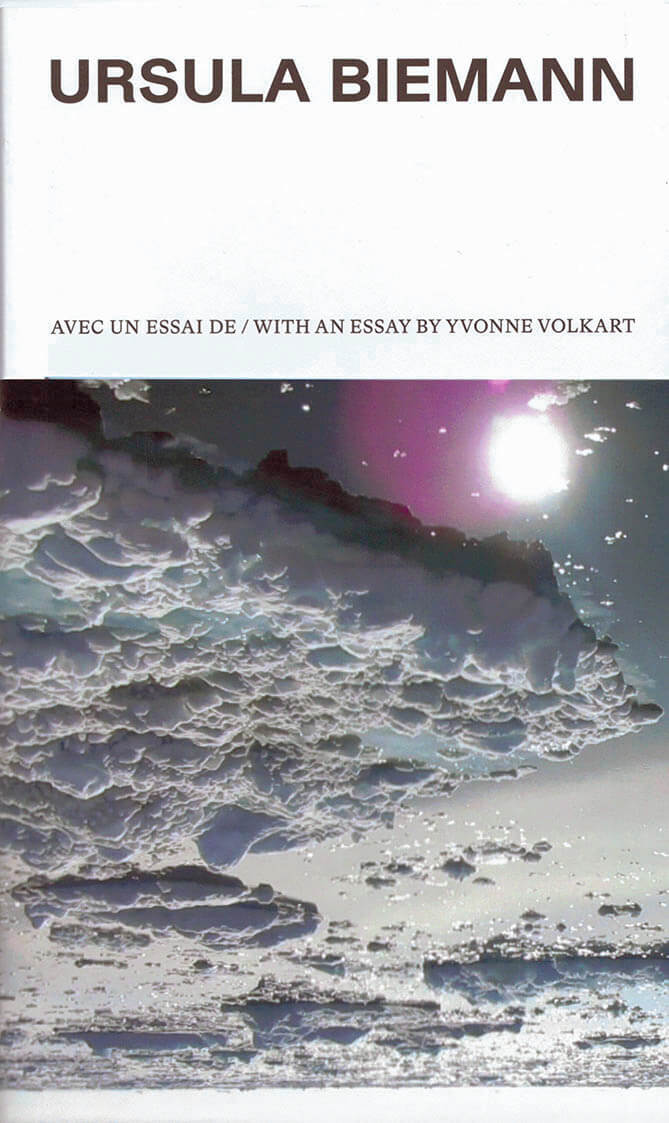
Ursula Biemann
A notebook based on Ursula Biemann's latest film, Acoustic Ocean, an expedition to the depths of the Arctic Ocean in search of interspecies communications.
32 p, ills colour, 14 x 23 cm, pb, French/English
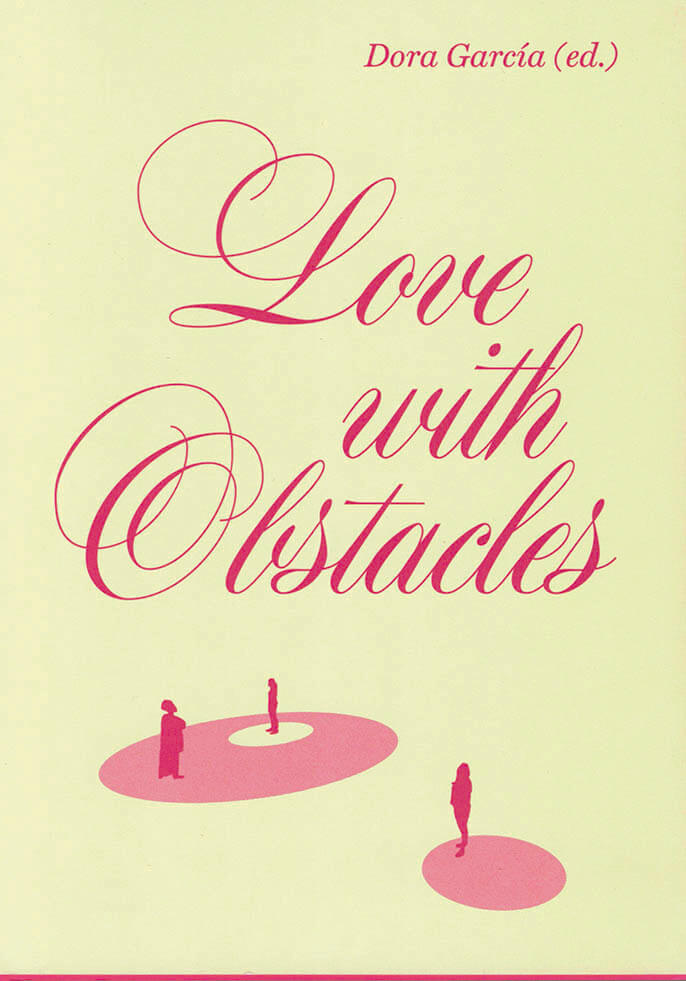
Love with Obstacles (Amor Rojo)
This is Spanish artist Dora García’s collaborative research on the life and legacy of Alexandra Kollontai (1872–1952), a socialist, activist, feminist, and intellectual. As a Soviet ambassador from 1922 to 1945, she advocated the sexual and social emancipation of women, and implemented many measures women continue to fight for today, such as legalising abortion and protecting women’s rights. Her writings found special resonance in Latin America, where her influence is still felt in contemporary feminist struggles.
The essays “On the Dragon” and “White Bird” are translated into English here for the first time, and are published alongside a selection of poems by Anna Akhmatova.

Licorice
'Licorice' is a novel, a mixed-up tale about a film, a windmill and city folk. The plot involves the making of a film by characters who are trying to gain permission to record the noises inside a reconstructed windmill to use as its soundtrack. When they don't succeed, the eponymous character Licorice makes an Aeolian harp out of bits she finds in a small electricals recycling bin. Licorice is the first title in the forthcoming Interstices series of books guest edited by Brighton based author Bridget Penney, whose previous publications include Honeymoon with Death and Other Stories (Polygon, 1991) and Index (Book Works, 2008).
144 p, ills colour & bw, 11 x 18 cm, pb, English

Decoding Dictatorial Statues
Decoding Dictatorial Statues, a project by Korean graphic design researcher Ted Hyunhak Yoon, is a collection of images and texts revolving around the different ways we can look at statues in public space. How can we decode statues and their visual languages, their object hood and materiality, their role as media icons and their voice in political debates?
Anticipating to current debates the book responds to urgent concerns about the representation of our heritage by not only asking us to examine what history to put on a pedestal, but to also consider the visual language of the statue itself. Decoding Dictatorial Statues therefore offers opportunity to level with the actual affairs the statues promote. In parallel to this deconstruction of the politics of a statue’s gestures the project discusses symbolic notion of culture and design by offering opportunity to another, and more cross-cultural understanding.
Ted Hyunhak Yoon(b.1987) is a graphic designer∙researcher based in Seoul(KR)∙Maastricht(NL). He graduated from MA Visual Communication, Royal College of Art in London, UK. From April 2017 onwards, he is a participant of a residency programme in Jan van Eyck Academie, Maastricht, Netherlands.
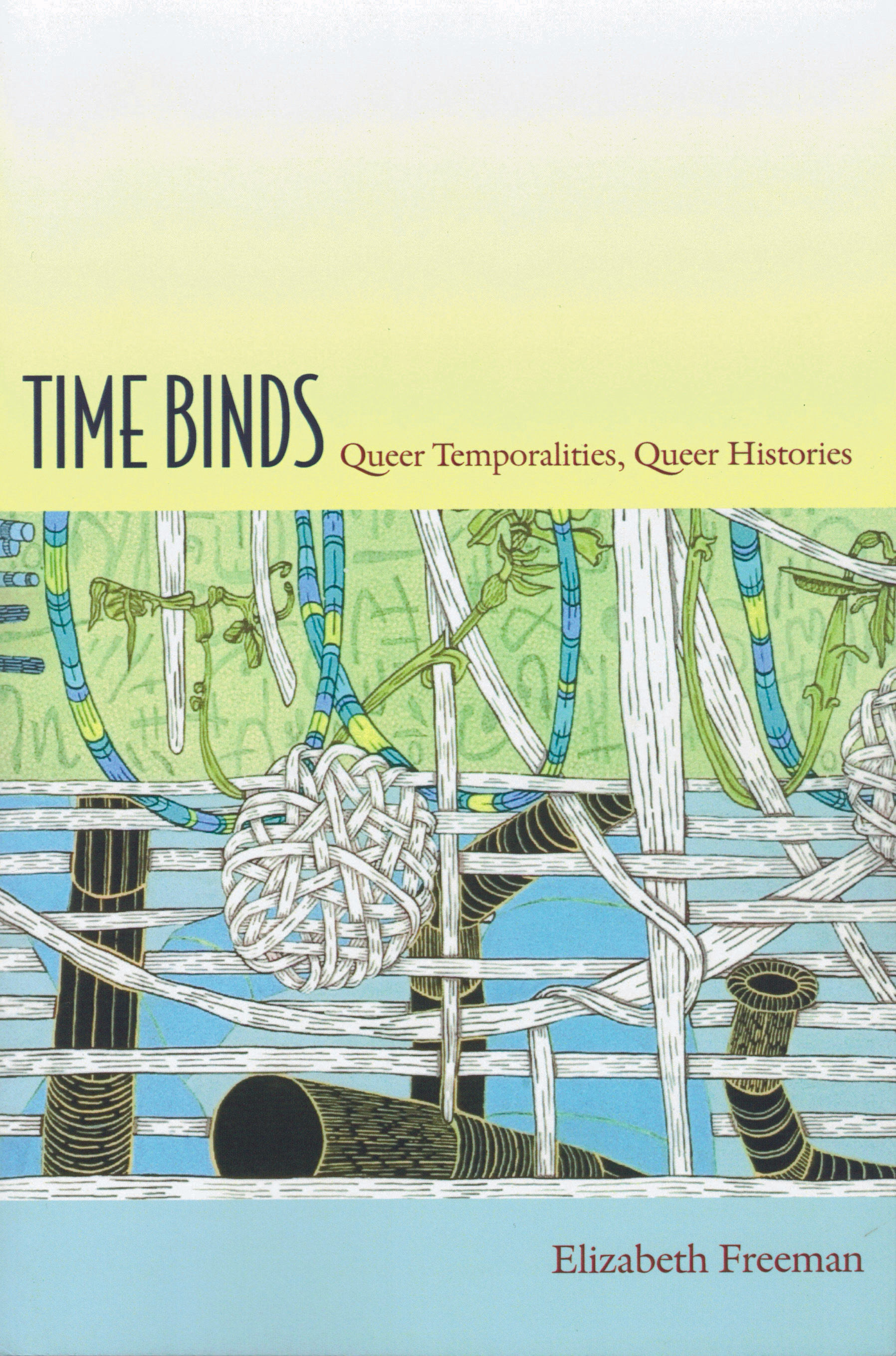
Time Binds - Queer Temporalities, Queer Histories
Time Binds is a powerful argument that temporal and sexual dissonance are intertwined, and that the writing of history can be both embodied and erotic. Challenging queer theory’s recent emphasis on loss and trauma, Elizabeth Freeman foregrounds bodily pleasure in the experience and representation of time as she interprets an eclectic archive of queer literature, film, video, and art. She examines work by visual artists who emerged in a commodified, “postfeminist,” and “postgay” world. Yet they do not fully accept the dissipation of political and critical power implied by the idea that various political and social battles have been won and are now consigned to the past. By privileging temporal gaps and narrative detours in their work, these artists suggest ways of putting the past into meaningful, transformative relation with the present. Such “queer asynchronies” provide opportunities for rethinking historical consciousness in erotic terms, thereby countering the methods of traditional and Marxist historiography. Central to Freeman’s argument are the concepts of chrononormativity, the use of time to organize individual human bodies toward maximum productivity; temporal drag, the visceral pull of the past on the supposedly revolutionary present; and erotohistoriography, the conscious use of the body as a channel for and means of understanding the past. Time Binds emphasizes the critique of temporality and history as crucial to queer politics.
Elizabeth Freeman is Associate Professor of English at the University of California, Davis. She is the author of The Wedding Complex: Forms of Belonging in Modern American Culture, also published by Duke University Press.

Women in Concrete Poetry: 1959-1979
Mónica de la Torre, Alex Balgiu
An expansive anthology focused on concrete poetry written by women in the groundbreaking movement’s early history. It features 50 writers and artists from Europe, Japan, Latin America, and the United States selected by editors Alex Balgiu and Mónica de la Torre.
Women in Concrete Poetry: 1959-1979 takes as its point of departure Materializzazione del linguaggio—the groundbreaking exhibition of visual and concrete poetry by women curated by Italian feminist artist Mirella Bentivoglio for the Venice Biennale in 1978. Through this exhibition and others she curated, Bentivoglio traced constellations of women artists working at the intersection of the verbal and visual who sought to “reactivate the atrophied tools of communication” and liberate words from the conventions of genre, gender, and the strictures of the patriarchy and normative syntax.
The works in this volume evolved from previous manifestations of concrete poetry as defined in foundational manifestos by Öyvind Fahlström, Eugen Gomringer, and the Brazilian Noigandres Group. While some works are easily recognized as concrete poetry, as documented in canonical anthologies edited by Mary Ellen Solt and Emmett Williams in the late ’60s, it also features expansive, serial works that are overtly feminist and often trouble legibility. Women in Concrete Poetry: 1959-1979 revisits the figures in Bentivoglio’s orbit and includes works by women practicing in other milieus in the United States, Eastern Europe, and South America who were similarly concerned with activating the visual and sonic properties of language and experimenting with poetry’s spatial syntax.
Artists and writers include Lenora de Barros, Ana Bella Geiger, and Mira Schendel from Brazil; Mirella Bentivoglio, Tomaso Binga, Liliana Landi, Anna Oberto, and Giovanna Sandri from Italy; Amanda Berenguer from Uruguay; Suzanne Bernard and Ilse Garnier from France; Blanca Calparsoro from Spain; Paula Claire and Jennifer Pike from the UK; Betty Danon from Turkey; Mirtha Dermisache from Argentina; Bohumila Grögerová from the Czech Republic; Ana Hatherly and Salette Tavares from Portugal; Madeline Gins, Mary Ellen Solt, Susan Howe, Liliane Lijn, and Rosmarie Waldrop from the US; Irma Blank and Ruth Wolf-Rehfeldt from Germany; Chima Sunada from Japan; and Katalin Ladik and Bogdanka Poznanović from the former Yugoslavia.
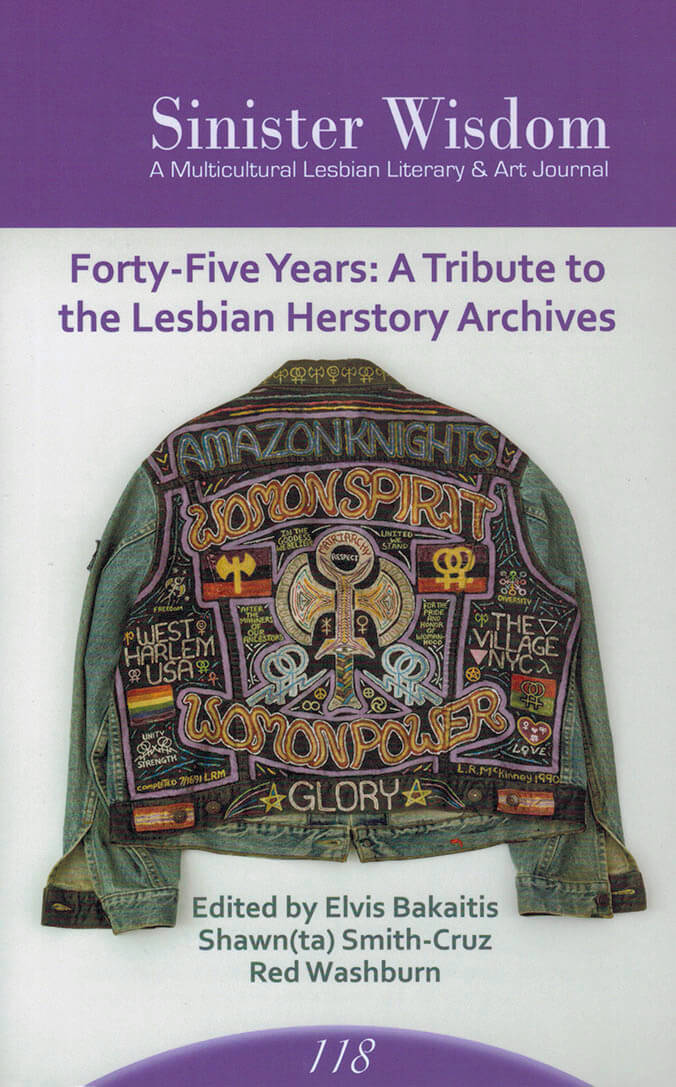
Forty-Five Years: A Tribute to the Lesbian Herstory Archives
Forty-five years ago movements of liberation made possible the birth of a new project in the world, the Lesbian Herstory Archives. In Sinister Wisdom 118 are some of the founding stories, telling what it meant to walk first into an apartment and later into a four-story limestone building, where shame became history, secrets became shared connections and complex lesbian, queer histories were enriched by maintaining intergenerational community.
A grassroots collection, the Archives was intentional about engaging with all facets and complexities of lesbian life, inclusive of diversity in race and gender-identity, from the bar life of the fifties and before, to the lesbian-feminist cultural richness of the mid-twentieth century and beynd, to the gender richness of the tweny-first. This issue honors an Archives that articulates the complexities of how lesbians make our way in the world.

Every Time I Am Away From The Internet, I wonder if I am loved
You know the feeling : you’re online, right, and for no particular reason, you start to feel weird. Like something glorious is about to happen. And then, just like that, it fades, the glory has passed; now you feel sad. Did you miss it?
Oh, what a time to be alive. I love this life. I sometimes wonder whether it loves me back, but I try and convince myself that such things don’t matter. Nothing does, and that’s the best part.
Well, anyway, this is an exploration of some of the feelings that could crush us in the digital 21st century.

Footfall Almanac 2019
The Footfall Almanac 2019 collects observations, objects and other traces to instigate a discussion on surveillance techniques currently deployed in shopping malls, and during public major events in Brussels.
Wireless tracking of mobile phones has become a common method to monitor crowds without requiring explicit permission or active cooperation. Private companies, as well as civil agencies, use it to keep a close eye on the movements of city dwellers through public spaces, the former to forecast sales and the latter for crowd management purposes.
The Footfall Almanac 2019 observes this encounter of actors and predictions in their shared technologies and terminologies.
With contributions by: Femke Snelting and Dennis Pohl.
This project was initiated on invitation from Constant VZW who has been invited by 431 Architects to participate in The New Local, part of the Precarious Pavillions in the context of Kaai Theater’s Festival: CITY:LAND.
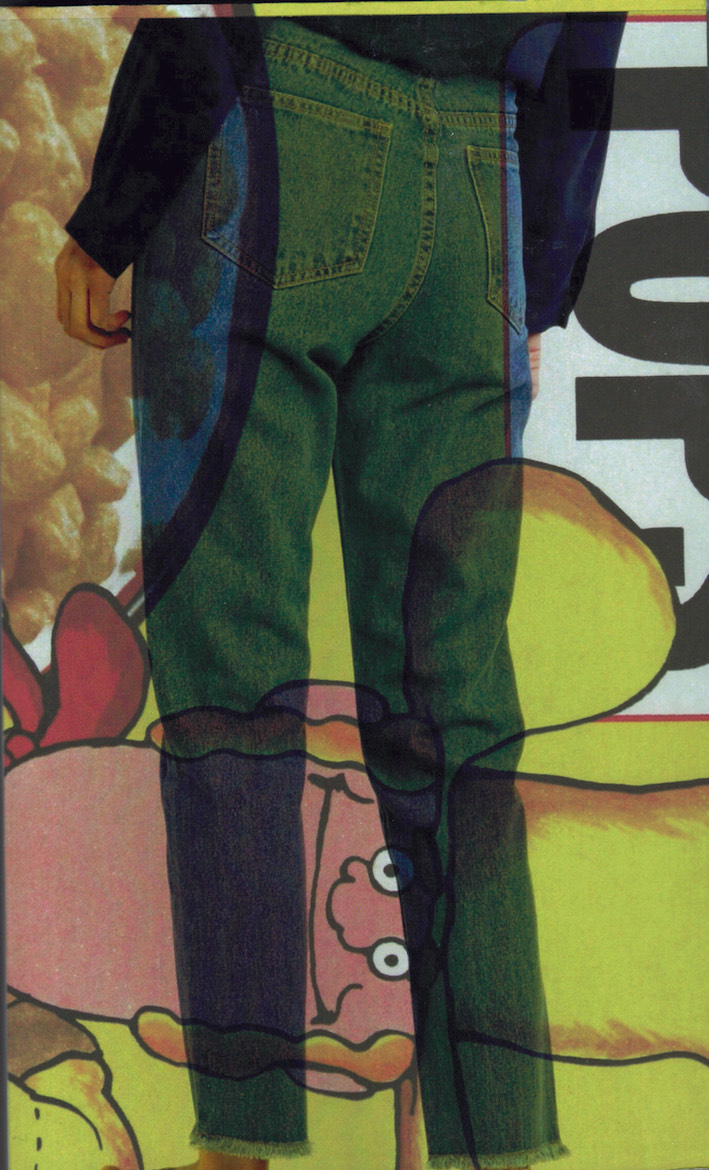
Homophone Dictionary
Homophone Dictionary was originally a file that is compiled by the now 96-year-old former schoolteacher Susan Nixon. She has build up many collections throughout her life, almost all of them exist out of objects, except one: after her retirement she compiled a word document that by now exist out of almost 1000 homophones; two, or more words that you pronounce similar but have a different meaning, often the spelling is also different.
The document is structured as a dictionary and the homophones are illustrated with examples that are based on autobiographical information. The structure of Homophone Dictionary also refers to speech therapy exercises and concrete poetry.
“As a student nurse learning medical terminology, I became fascinated with understanding the roots of words. When I had a young family, words were a principal source of entertainment: it was not unusual for one of the children to slip from their chair at the dinner table and fetch a dictionary in order to settle a dispute or satisfy someone’s curiosity. Then I became a teacher and brought this love of words into the classroom. My habit of word collecting became the children’s habit – my pupils became ‘word-lovers’ and ‘list-makers.’
I casually collected homophones for years. When introducing homophones into the classroom, the kids found definitions dull; the typical reaction was, ‘Yes, but give me a sentence using the word!’ and this idea emerged: a book of sentences demonstrating the meanings of homophone pairs or sets.”
Author Sue Nixon, editor Riet Wijnen, Offset print
20,4 × 12,4 cm, 423 pages
edition of 500
Published 2020

one long continuous line or a thought that dissolves into the distance
A short text or a long line written by Mette Edvardsen for Etcetera magazine (June 2018) on an invitation to elaborate on her approach to text, writing and speech from a choreographic point of view. Held by a cardboard cover, the text is here published on its own as a very slim book.

Moments Before The Wind
Moments Before the Wind is a heterogeneous collection of notes on scenography that offers a glimpse into the poetics and artistic practice of Jozef Wouters. These reflections on space, scenography, art making and institutional critique have developed over the years as they were written out loud in various contexts. Now settling on the page among built and unbuilt spaces, they’re an invitation to the reader to think along or against, and think up space for oneself. Edited by Jeroen Peeters; graphic design by Filiep Tacq.
Jozef Wouters is a scenographer and theatre maker based in Brussels, who develops work in collaboration with his Decoratelier. Decoratelier is also a workplace for set designers and artists, and provides room for cross-disciplinary ventures and social experiment.

FUNGI
Dries Segers photographed all tangible fungi organisms in Dudenparc Brussels. Fungi are the oldest living species on our planet. They build and spread their communities across human borders continents laws … They take over land without asking permission. They clean up toxic messes in disturbed landscapes and shake the land back to life to create livable grounds for animals plants and maybe humans. They have the power to transport energy between weaker and stronger trees to keep forests alive or to kill them. Their spores are invisible and spread and spread and spread.
“The uncontrolled lives of mushrooms are a gift — and a guide — when the controlled world we thought we had fails.” — Anna Lowenhaupt Tsing
Published 2019
36 pages 28×42 cm
design: Chloé D’hauwe & Ine Meganck
text: Hannah De Meyer
print: Stockmans Duffel

For a Time
Published in conjunction with the exhibition For a Time Light Must Be Called Darkness. Lina Selander in collaboration with Oscar Mangione held at Argos, Centre for Art & Media, Brussels, 24.09.2017 - 17.12.2017.
About the exhibition:
For a Time Light Must Be Called Darkness features six video installations, most of them made in collaboration with Oscar Mangione. These works take us to Bredäng (a suburb in south-west Stockholm), Berlin, the West Bank, Pripyat and Chernobyl. All of these places are the occasion and the starting point for broader reflections about our present in relation to historical facts. Selander visits these sites and like an archaeologist digs in their past, their monuments, museums and archives. She looks for visual documents, focuses on details and analytically sketches new hypothesis. In this way, she tries to retrace hidden links between distant imageries, correspondences and analogies, in order to create new narratives. In her essayistic approach, Selander combines her own texts and footage along with still images, quotes and archive material. In this way a constant tension springs within these multiple-layered audiovisual works and reminds us that seeing is never an innocent act.

Off by Heart
Between 2014 and 2016, the artist Wendy Morris started off on different walks along the west coast of Europe, following the path of a family of Huguenots during the repression after the Edicts of Nantes at the end of the 17th century. Throughout her walks, Morris drew new maps and routes of the places visited by the Huguenot refugees, who just as today passed through Calais and Dunkerque in France, moving on to Blankenberge, Zeebrugge and then Vlissingen as their final destination in the Netherlands. Then and now again, these ports and places were known as escape routes towards a better future.
It is their experiences that Morris tries to elucidate via carefully selected texts fragments, recited psalms and testimonies that are juxtaposed with official publications and regulations dictated by the Catholic Church against these Huguenots. The artist also mapped her own route while simultaneously making notes and collecting samples of grass, trees, seeds, plants, and the like, which may have been used by the refugees to heal the daily injuries caused by the long trip.

Foundlings
Foundlings, a video film, was shot near Wexford, in the south east of Ireland where she grew up. This visual poem without a particular narrative and full of autobiographical elements is set at a very slowed down pace. Floating images and heavy voices are central to the associative strategy that is at work here. The images allow one to listen to a hypnotic voice, while at the same time allowing the eyes to wander... to daydream... to travel over drawn out time. The images are country images, images of repetitive calm, the kind of calm one finds between awake and asleep. The speed of the sea sets the pace, regular yet irregular. The images are inhabited by people who cannot speak. Who are busy doing nothing, except passing time. Silent brothers and sisters of the sea.
The soundsculpture Unsaid, a joint work by Orla Barry and Portuguese artist Rui Chafes (1964), is very opposite to the film. The film is full of open spaces and bright colours. The sculpture is black, closed and claustrophobic and on top of that it is housed in a narrow tower five meters tall. The visitor has to take place on a rather unconventional chair and put his head in a closed off sphere, surrounding himself by darkness and leaving him with his own heartbeat. A voice addresses the visitor directly on highly intimate terms. The seating is hard and uncomfortable. One has to be strong to experience this piece that is a perpetual struggle between body and mind.
At the occassion of Barry’s show argos editions published Foundlings, a combined artist book and catalogue that can be ordered through argos. The book includes a DVD.
Orla Barry (1969) is an artist who centres her practice on language, written and spoken. Her work is strongly poetic and lyrical, crossing a wide variety of media. Barry was born in Ireland, and the rhythm of her phraseology, the pictorial and narrative vernacular on which she draws, somehow evokes her homeland’s topography, climate and literary heritage. At argos the artist presented two new works.

Encounters
Encounters. On three films by Manon de Boer, Marine Hugonnier, Sven Augustijnen, George van Dam, Tris Vonna-Michell and Helena Holmberg.
Awarded for the Fernand Baudin Prize 2013

Practice Space
This publication emerges from an effort to better understand the conditions of contemporary art in disparate places. Featuring new writings in a variety of discursive forms (commissioned essays, conversations, profiles), the book is organised around three key terms: local time, situated infrastructure, and “cotranslations”.
Furthermore, it gathers perspectives and approaches to “the local” from art initiatives that operate outside of conventional frameworks. As the authors consider place and context in terms of social, economic, political, and historical circumstances, their writings also reflect upon these notions as sites for different conceptions of the self in relation to the world.
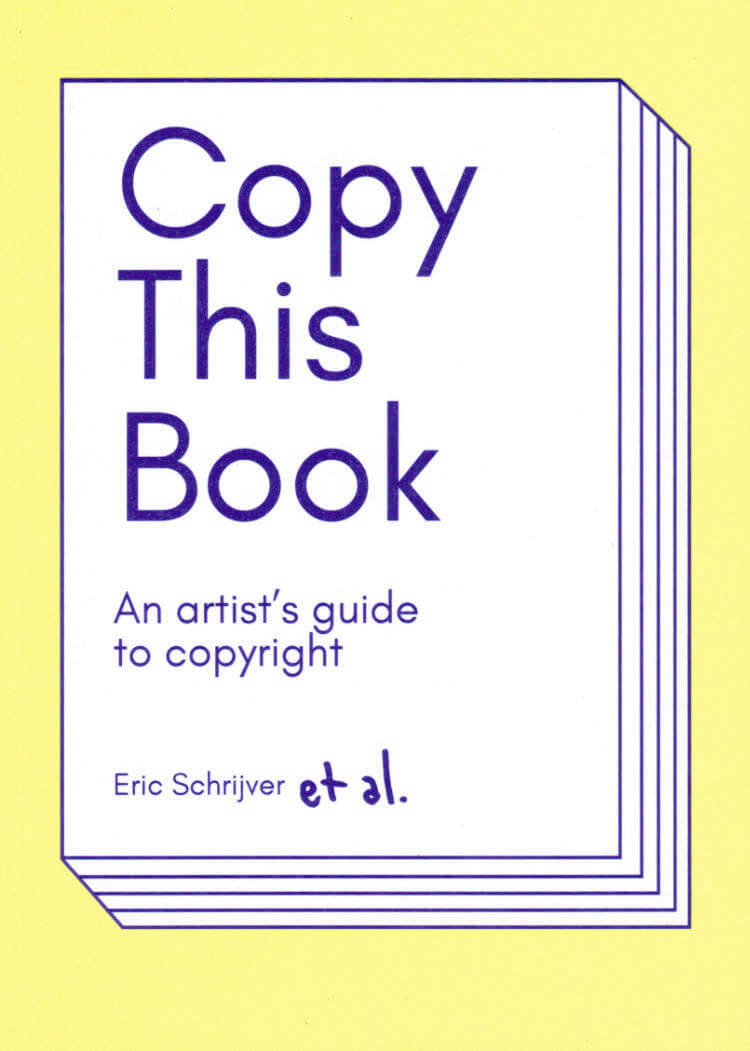
Copy This Book
This book is an artist’s guide to copyright, written for makers. Both practical and critical, this book will guide you through the concepts underlying copyright and how they apply in your practice.
How do you get copyright? For what work? And for how long? How does copyright move across mediums, and how can you go about integrating the work of others? Because they get copyright too!
Copy this Book will detail the concepts of authorship and original creation that underlie our legal system. This way, it will equip you with the conceptual keys to participate in the debate on intellectual property today.
This sharp and useful book shines a light on the rights of all artists to protect—and share—their work. Eric Schrijver has produced an essential guide for navigating the new Commons and the old laws of copyright control.
— Ellen Lupton, curator and critic

Le Chauffage — Issue #1
Le Chauffage (french for “The Heater”) is an artist-run publication based in Brussels. It is conceived as a cross-continental, community oriented platform. Bringing together the work and writing of artists / friends from different cities, Le Chauffage intends to spark discussions and fuel casual forms of critical discourse.

Mystic Transport
Mystic Transport is an exhibition project initiated through a chance encounter between two artists, Koen Theys and Gülsün Karamustafa. Both are very much intertwined with the city they live in; Brussels and Istanbul and integrate visible and invisible materials and remnants from their immediate surroundings within their practice.
Intrigued by religious parades, the hamam, war propaganda, gender issues and the entertainment industry, Theys and Karamustafa use these phenomena as starting points for their video work, installations and performances. In doing so, both artists sketch a critical portrait of the society and culture in which we live and reside, reflecting on cultural canons and differing socio-economic realities. Mystic Transport thus results in unique crossovers.

Els Dietvorst E.D. (2010–2014)
This publication presents a survey of the work of Els Dietvorst from 2010 to 2014. This is also the period in which she left Brussels to live in a village on the south-east coast of Ireland, where she focused on projects such as The Black Lamb. The audio piece One was killed for beauty, another one was shot, the two others died naturally is included on an audio CD.
Els Dietvorst E.D. (2010–2014), Rolf Quaghebeur, Eva Wittocx, Katleen Weyts, Els Dietvorst, Brussels, 2014.
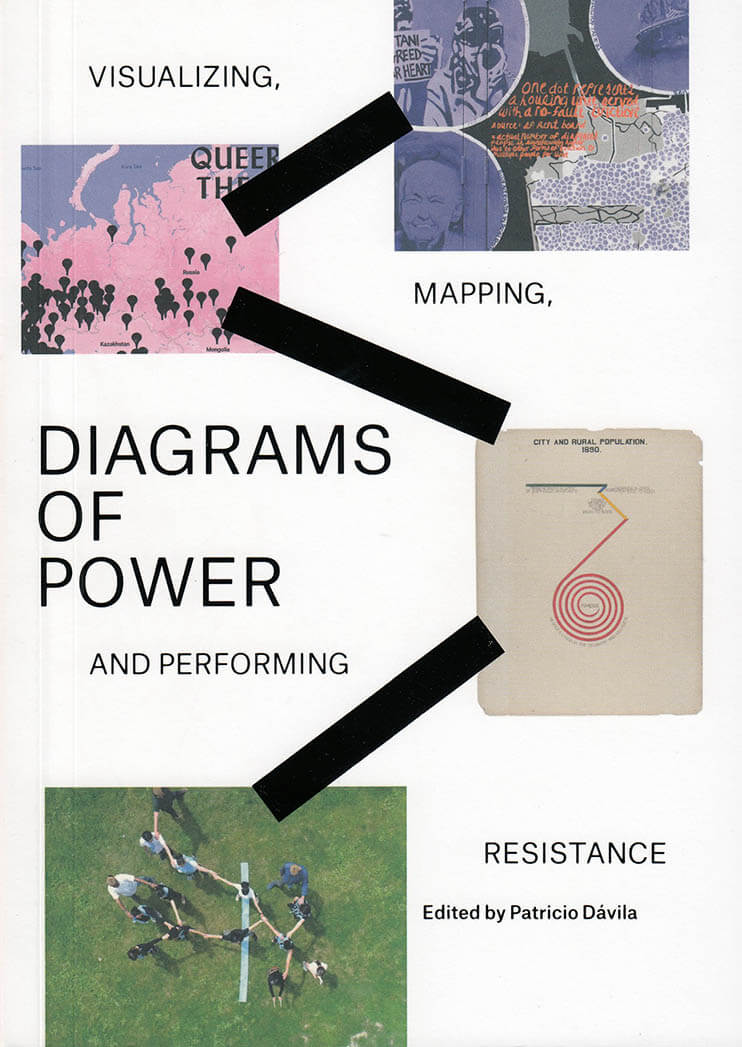
Diagrams of Power
Diagrams of Power: Visualizing, Mapping, and Performing Resistance, brings together the work of designers, artists, cartographers, geographers, researchers and activists who create diagrams to tell inconvenient stories that upset and resist the status quo.
Edited by Patricio Dávila. Words and works by Joshua Akers, Burak Arikan, Josh Begley, Joseph Beuys, Alexis Bhagat, Vincent Brown, Bureau d’Études, Teddy Cruz, Department of Unusual Certainties, Peter Hall, Alex Hill, W.E.B. DuBois, Patricio Dávila, Catherine D’Ignazio, Forensic Architecture, Fonna Forman, Terra Graziani, Iconoclasistas, Lucas LaRochelle, Eliana MacDonald, Julie Mehretu, Lize Mogel, Ogimaa Mikana, Margaret Pearce, Laura Poitras, Philippe Rekacewicz, Sheila Sampath, and Visualizing Impact.